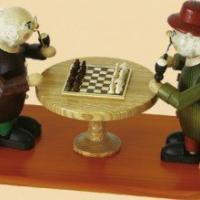
Zugzwang
Zugzwang is a term originally used in chess which also applies to various other games. The concept finds its formal definition in combinatorial game theory. It describes a situation where one player is put at a disadvantage because he has to make a move – the player would prefer to pass and make no move. The fact that the player must make a move means that his position will be significantly weaker than the hypothetical one in which it is his opponent's turn to move. In game theory, it specifically means that it directly changes the outcome of the game from a win to a loss.
For Example:
1). 1.e4 … Simply an overly aggressive gesture that amounts to nothing more than a premature attack. Black is too solid for this sort of nonsense to work. Such a suicidal pawn push as e4 tilts at windmills, throws looping uppercuts into thin air. Black ducks, blocks, or holds and soon his counter-attack will crash through.
2). 1.d4 … A misguided feint. This kind of clumsy nuance can not save White from succumbing to a myriad of set-ups Black has at his disposal to seize the initiative through swift breaks against White’s over-extended center. Black has an easy game.
3). 1.c4 … Timid and stodgy, much too slow. Countless systems work here for Black to take full control of the play based on the slight weakening of the d4 square the c4 created. Simply a bad move in a bad position.
4). 1.Nf3!? … The best try! White neither sticks his neck out with rash attacks nor does he sit back and wait to get steamrolled. Unfortunately for the first player, their exists 1…Nf6!! A crushing reply, again placing the onus of finding a useful move at a moment when none exists. Whatever White chooses as his path now, clearly Black is better.
5). 1.Any other move … Obviously a foolish decision. The player of the White pieces shows a blatant disregard for the laws of proper play, and will be punished. We will not waste any of our time here on discussion.
The only thing to do after Black starts the clock is to simply resign, shake hands, and turn the board around for a rematch!




